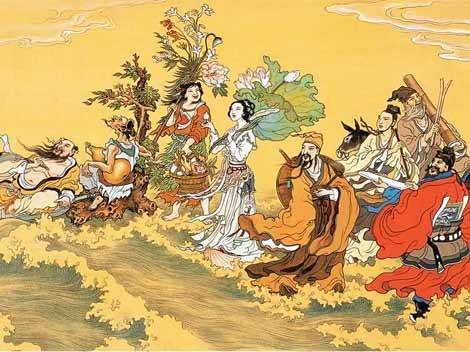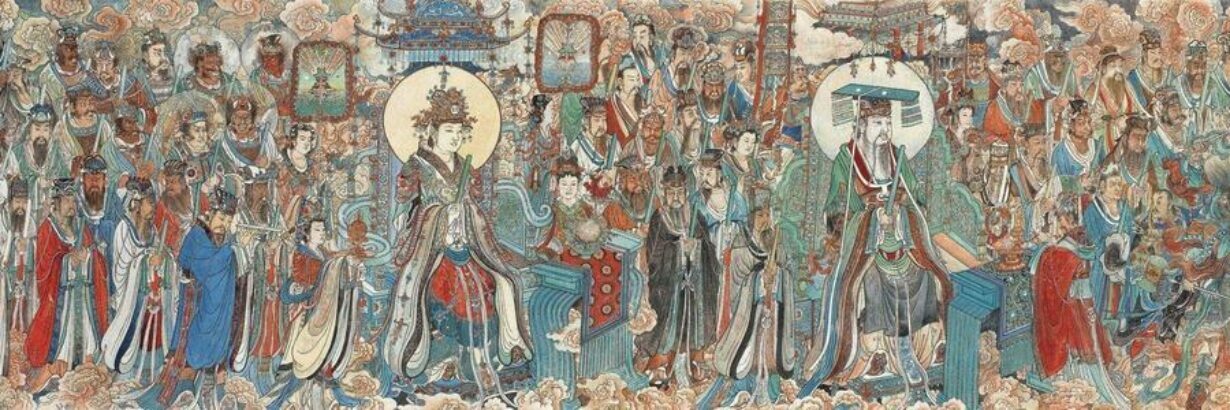Immortals, in ancient mythological legends, refer to extraordinary beings who possess limitless abilities, transcend the mundane world, and enjoy eternal life.
There is a distinction between gods and immortals: gods are innate gods or deified ancestors, while immortals are individuals who have achieved immortality through cultivation or fortuitous circumstances. However, in common parlance, gods and immortals are often referred to collectively.
- The Tao is formless and shapeless, and practitioners of Tao can become immortals through cultivation.
Taoism holds “Tao” as the highest belief. The Tao is formless and shapeless, yet it gives birth to everything in heaven and earth. The manifestation of the Tao in humans and all things is “virtue.” Therefore, all things revere the Tao and value virtue. When the Tao disperses, it becomes qi (energy), and when it gathers, it becomes spirit.
Taoism distinguishes two types of gods. First, there are innate gods, representing the essence of the Tao, such as the Three Pure Ones. Second, there are deified gods, including virtuous individuals or those who have made significant contributions after death, who are enshrined as celestial gods, earthly gods, and ancestor gods. Immortals belong to the deified category and are those who have achieved the Tao and serve as exemplars.
Among these immortals, the highest pursuit for Taoist practitioners is the Grand Luo Immortals. The Grand Luo Immortals are beings who transcend all time and space, eternally carefree and immortal. The term “Grand Luo” refers to the highest level among the 36 heavens in Taoism, which is the origin of the Grand Luo Immortals.
- Diverse opinions exist regarding the classification of immortals.
Different Taoist scriptures provide various classifications and interpretations of the types and grades of immortals.
During the Jin Dynasty, Ge Hong, in his work “Baopuzi Neipian: Lun Xian” (Inner Chapters of the Master Who Embraces Simplicity: On Immortals), referenced the “Xian Jing” (Classic of Immortals) to divide immortals into three categories: Celestial Immortals, Earthly Immortals, and Corporeal Transcendent Immortals. He stated, “The highest-ranking individuals take physical forms and ascend to emptiness, known as Celestial Immortals. The intermediate-ranking individuals wander in famous mountains, known as Earthly Immortals. The lowest-ranking individuals die first and then undergo transformation, known as Corporeal Transcendent Immortals.”
During the Liang Dynasty, Tao Hongjing divided immortals into seven levels in his work “Zhen Ling Wei Ye Tu” (Chart of Positions of True Spirits): Jade Pure, Upper Pure, Taiji (Supreme Ultimate), Supreme Pure, Nine Palaces, Cavern Heaven, and Supreme Yin.
In the Northern Zhou Dynasty’s “Supreme Secrets of the Highest Esoteric Teachings,” immortals were classified based on the levels of achieving the Tao and becoming immortals: Guigan Officials Daoist, Earthly Immortal Daoist, True Earth Daoist, Nine Palaces Daoist, Supreme Pure Daoist, Taiji Daoist, Upper Pure Daoist, and Jade Pure Daoist.
During the Tang Dynasty, Sima Chengzhen categorized immortals into five types in his work “Tian Yin Zi” (The Hidden Child of Heaven): Human Immortals, Earthly Immortals, Celestial Immortals, Water Immortals, and Divine Immortals.
- Types and grades of immortals
During the Qing Dynasty, Wang Jianzhang summarized the grades of immortals in his work “Xian Shu Mi Ku” (Secrets of Immortal Techniques) and stated, “There are three paths and five grades of immortals.” The five grades of immortals are Celestial Immortals, Divine Immortals, Earthly Immortals, Human Immortals, and Ghostly Immortals, which form the foundation of the immortals’ hierarchy.

Based on this, he further delineated and positioned the grades of immortals in more detail.
- Ghostly Immortals
When cultivators reach the end of their practice and die, a trace of their spirit remains, attaching itself to an object, known as Yin Gods, Ghost Gods, Pure Spirits, or Corporeal Transcendent Immortals. They are the lowest grade among the five grades of immortals and can only attain the Heavenly Immortal Dao fruit by reincarnating and practicing again.
- Human Immortals
Cultivators who practice to eliminate diseases, prolong life, and live without calamities or afflictions, but have not attained enlightenment in the Great Tao, will eventually reach the end of their lifespan. They do not possess the fruit of eternal life, making them the second lowest grade among the five grades of immortals.
- Divine Immortals
Cultivators who, out of disgust for the worldly life, diligently practice until they forget themselves completely, undergo a self-transformation. By refining the impurities of their primordial spirits, achieving pure yin and pure yang, and having an external body, they transcend their mortal forms and ascend to become immortals. They comprehend the Great Tao, ascend to the Grand Luo Heaven, and achieve liberation without any burdens. They can freely gather or disperse their primordial spirits in the heavens and on earth at any time. With immense supernatural powers, they are also known as Grand Luo Immortals. They belong to the highest grade among the five grades of immortals.
- Celestial Immortals
Divine Immortals who voluntarily serve the Heavenly Court, are granted heavenly books, and achieve the Supreme Celestial Dao fruit.
- Earthly Immortals
Earthly Immortals are individuals who possess half of the powers of heaven and earth. They have not attained enlightenment in the Great Tao and are limited to minor achievements. Their accomplishments are not visible, but they can live long lives without dying in the mortal realm.
Written and Translated by Daoist Liu Cheng Yong, German Daoist Association.
